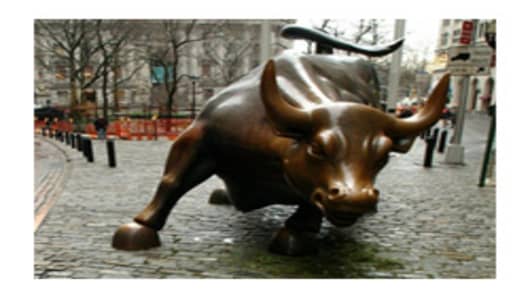"It's a huge deal because this sends a message to the 98 percent of the people that don't watch the market every day," said Hogan.
Sheldon said though there's been a sea change in investor psyche and that could make 10,000 less meaningful.
"One of the things that has more lasting change is the lack of confidence. Cash coming down mostly from retail investors has not come into stocks. When you look at mutual fund flows, a lot is going into fixed income," he said.
It won't be a negative either, he says. "I think people will not look at the 10,000 level as a chance to sell," he said. "There is still room for upside. Normally, after times like this you'd look at sentiment and say it would be at extremes, but clearly it is not," Sheldon said.
Earnings surprises, a better than expected holiday shopping season and the investable pile of cash, capable of moving into stocks at every dip, are all factors that could drive the market higher into the end of the year.
Sheldon said those factors will likely put the market slightly ahead of where it is now by year end, but the question is what's ahead in 2010. Sheldon expects third and fourth quarter earnings to be helped by cost cutting and the positive impact of the weaker dollar on foreign sales.
"It's more what's happening in 2010. The fourth quarter has set up easy comparisons. As you get into 2010 that's where the whole top line question comes in as opposed to cost cuts," he said. As the markets move into 2010, there are also unanswered questions about taxes and the uncertainty around the economy.
"We certainly transitioned from 'things are horrible' to 'less bad' to 'arguably better,' but we're still quite a ways short of 'good,' and that's the recovery as we see it," he said.
Sheldon said the market's gains will be smaller, and he expects higher quality names to take the lead. A lot of the rally has been led by lower quality issues, which were priced for "disaster."
"I think people will not look at the 10,000 level as a chance to sell," he said. He also adds it would not likely be a big catalyst to draw in individual investors, who may have missed the rally.
Sheldon said his favorite sectors are tech, energy, industrials and materials. "We're not overly emphasizing defensive plays and the staples," he said. "...We're definitely looking for a play on quality. We've probably been there already, but the companies that got a new lease on life in and in an improved economic outlook. What we're seeing now are the beginnings of improved performance for higher quality stocks."
And the bright spot this year might turn out to be a holiday gift for investors if consumers head to the stores. "It's just because there's an almost universal view that the consumer is gone and not coming back, and while that will play out over the long run it just makes you wonder if they can continue to 'non spend' at the rate they have...Expectations were so low it doesn't take a huge amount," he said.
He does not believe that view is priced in to the stock market yet. "What the expectation is for the retailers and consumer at year end is very low. There's some potential for upside there. You re not fighting this huge amount of embedded optimism. It's creeping in but it's nowhere near what we've seen," he said.
Questions? Comments? marketinsider@cnbc.com



